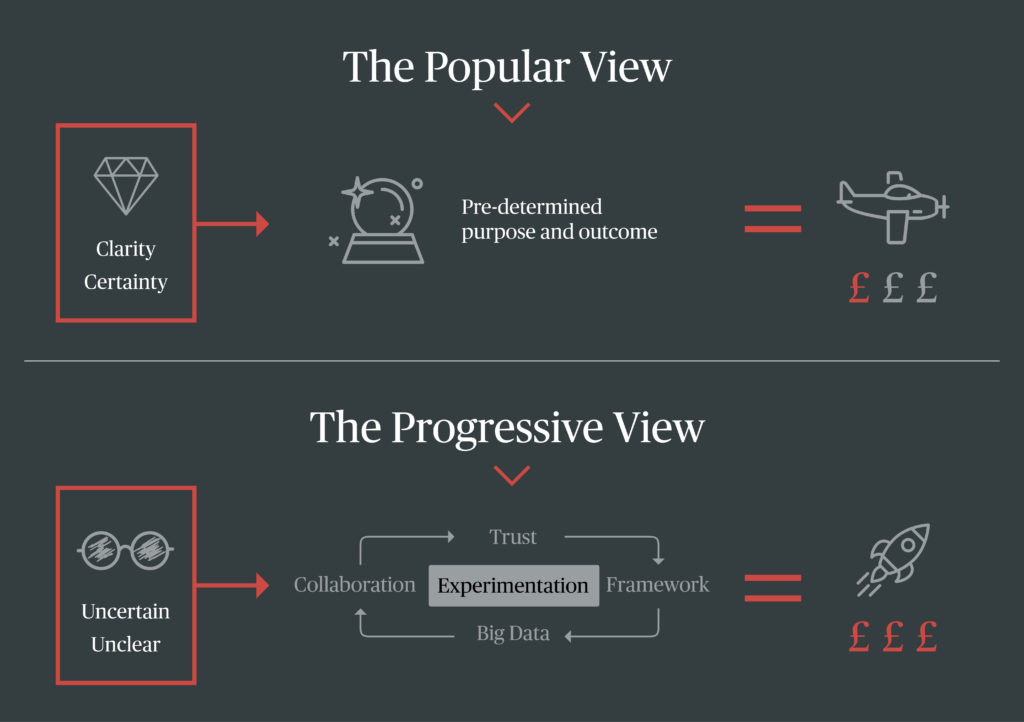
Sure, some ideas for AI in media are getting productionised. Bits of workflow, applications that enable better content search and targeting, and a few more creative – and occasionally disturbing – instances of AI are now things you can actually buy. AI has the potential to be a game-changer, which is why there is massive hype around it[1]. What’s desperately needed, though, is time and space to identify the really transformative applications.
Certainty stifles invention
People claim clarity and certainty for obvious reasons. Let’s face it: few investment pitches, board papers or sales proposals are built on a promise of great uncertainty. Yet unlocking technologies like AI involves investment in experimentation – simply bringing together the right raw materials in the right environment and just seeing what happens. Searching for Yetis has always been pointless, but that hasn’t stopped Yeti-searching teaching us some of our most valuable lessons about one of the planet’s most hostile environments.
Investors, executives, entrepreneurs, lawyers, accountants and technologists should all gather enthusiastically around the great AI experiment: focus less on securing predetermined outcomes or easy-to-calculate ROIs, and more on enabling the world’s best minds, content, data and technology to mingle and peer out into the media cosmos.
Data, collaboration and trust
In addition to mindset AI and machine learning, especially deep learning, need data, and lots of it: the kind of data that few standalone organisations have. Even global-scale organisations openly admit they may not have enough data to use machine learning effectively.[2] Really effective experimentation will require collaboration between uneasy bedfellows. Collaboration requires trust. Trust requires clear, robust, balanced frameworks within which competing interests can briefly align for the benefit of the greater good.
Even from a glimpse, these frameworks will require fresh thinking on IP, solid reassurance on confidentiality, data- and cyber-security, innovative commercial approaches to sharing the spoils and creative funding models.

Starting at the end: identifying the problem
The exploration of AI’s potential needs to be undertaken free of a desire to fix any particular problem. The first part of the experiment needs to be to allow the problem to emerge. Chances are, when AI finds a problem it will also offer a potential solution at the same time. And then the game is on.
Why everybody and nobody is talking about AI
Eighteen months on from IBC2017, when everyone wanted to talk about AI and machine learning, one of the most striking elements of the mood music at NAB 2019 was how little most people had or, perhaps more tellingly, wanted to say about it. Just as media-hype around AI is at maximum volume we’re entering the period of anti-hype. That’s probably not a bad thing, provided that any resulting calm is used for experimentation and exploration rather than just waiting for clarity and certainty: the faster we become confident we know what to do with AI, the less of its potential we’ll realise.
[1] Perhaps that explains the predicted average ROI of 20% for AI and machine learning across media/telecoms/tech – the highest of any industry surveyed for the recent Deloitte report, ‘State of AI in the Enterprise, 2nd edition’.
[2] Bird & Bird event held on 17/9/2019 ‘Hate Speech, Fake News & Social Media: Time for New Responsibilities or Moral Panic?’ (Chatham House Rules apply).









